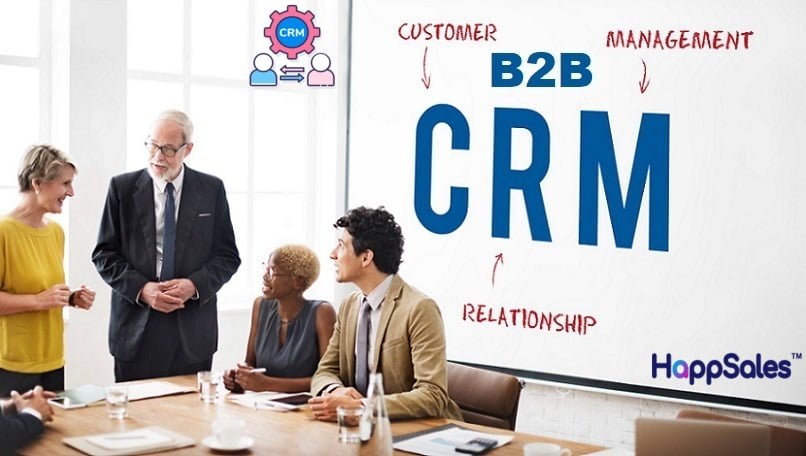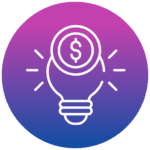Last updated on April 11th, 2025 at 11:41 am
What is B2B CRM software?
B2B refers to Business to Business and CRM stands for Customer Relationship Management.
A B2B CRM software involves systems, technology, processes and strategies to help B2B companies manage their relationship with both existing clients and potential prospects. The right B2B CRM tool coupled with sales automation capabilities enables you to enhance client relationships and grow your business profitably. It helps you increase your revenue, serve your clients better and improve customer retention. It is also referred to as a CRM for Key Account Management
B2B CRM vs B2C CRM – how is it different?
B2B companies and B2C companies represent two different types of business models with unique characteristics. In the case of B2B, companies sell their products and services to other companies. While in B2C, companies sell their products and services directly to end-consumers.
A few key differentiators are:-
Sales cycle
B2B companies undergo longer sales cycles compared to B2C companies.
Business relationships
B2B sales involve long-term ongoing relationships. B2C sales are generally transactional and short-term.
Decision makers
B2B transactions involve many decision makers and stakeholders compared to B2C transactions.
Quantity of leads and lead management time
The leads in B2C sales are generally more in number compared to B2B Sales. And the time spent on B2B leads is higher compared to B2C leads.
Sales Stages
B2B sales processes involve multiple stages compared to B2C. In B2B, the prospect goes through multiple buying stages which is usually not seen in the case of B2C deals.
Sales methodology
B2B sales involves high-touch engagements and relationship-driven sales. Whereas B2C is more of brand-driven sales with low-touch engagements.
Pipeline management
B2B needs to have a very high level of focus on sales funnel and sales pipeline to drive predictability compared to B2C.
Average deal value
The average deal value in B2B Sales is much higher compared to B2C Sales. It can range from several thousands to millions of dollars depending on the industry, product or service and other factors.
Customer success and post sales operations
Retaining customers is very key and important in B2B sales. Happy customers can open up many up-sell and cross-sell opportunities which is very important in B2B transactions.Hence its important to provide excellent post sales operations.
 Related Read – B2B CRM vs B2C CRM: Which is Right for Your Business?
Related Read – B2B CRM vs B2C CRM: Which is Right for Your Business?
Why do B2B companies need B2B CRM
Strategic Key Account Management
The main goal of Strategic Account Management is to understand and address the unique needs of your key customers in an efficient and holistic way. 360-degree account management improves customer satisfaction, more repeat sales, and better customer retention. Implementing the right CRM tool for Key Account Management is imperative to manage all these aspects efficiently to grow your business profitably and consistently.
Related Resource – What is Key Account Management (KAM)?
Long complex sales cycles require comprehensive opportunity management
The process of identifying and managing opportunities is the most important aspect in a B2B sales process. The entire sales process starting from lead management to deal closure is called opportunity management. A B2B CRM offers a centralized platform to organize and track meticulously the different stages of a deal. It serves as a linchpin for comprehensive opportunity management and improves overall effectiveness of the entire sales process.
Visibility into sales pipeline to run a predictable business
A structured sales pipeline management for better visibility into the pipeline is very important for a successful sales organization. It helps you to enhance your sales forecasting strategies that provide many benefits. A B2B CRM helps you to not only calculate the sales pipeline but also gives a clear visibility into the weighted sales pipeline. Calculating weighted sales pipeline is important for B2B companies as it also considers closure probability of the deals.
You can read a detailed article here to understand the difference between total sales pipeline and weighted sales pipeline. Ultimately with a CRM tool, you will be able to forecast your deal closures with better accuracy.
Read our detailed blog on – Difference between total sales pipeline and weighted sales pipeline.
High costs associated with poor lead management process
Inefficient lead management can result in missing high-value leads, wasted resources, and decreased sales productivity. A CRM acts as a pivotal tool for lead generation, lead tracking and lead nurturing. It not only helps to plug these leakages but also optimizes operational efficiency. It acts as a powerful and cost-effective solution to elevate your sales process.
Complex order management workflows
Order workflow management is a pivotal component of a specialized B2B CRM software. It enables businesses to streamline and optimize their order processing stages. B2B transactions are complex and involve multiple process owners. A seamless order workflow management ensures effective collaboration between different departments. It helps to automate routine tasks, reduce errors, and help to have real-time visibility into the order status. This facilitates better allocation of resources and efficient collaboration among different team members.
Long collection cycles require streamlined accounts receivable (AR) process
Efficient accounts receivable operations is very important to run a sustainable business. Many companies face challenges in reducing daily sales outstanding (DSO). A B2B CRM like HappSales has an integrated framework of accounts receivable within CRM system. This enables companies to reduce the DSO helping to stay top with your collections. This leads to healthier cash flow and improved working capital.
Need to automate post-sales service operations
Service teams are constantly under pressure to maximize their service visits and to improve customer satisfaction. It is necessary to document and track all service related information and activities for service compliance. A field service management software app empowers field service professionals with FSM software to automate end-to-end field service operations.
Customer success & retention is essential to maximize lifetime value
It is very important to keep our customers satisfied and happy. Happy customers can positively impact your business and increase your brand equity. Therefore you must measure customer satisfaction objectively. HappSales B2B CRM helps you to capture customer feedback at regular intervals and take necessary proactive steps to build customer loyalty.
Most essential features of B2B CRM software
360-degree Account Management
A very important feature of B2B CRM software is to support deep account management and contact intelligence. This information serves as a centralized repository providing you with the required information as and when needed. With a B2B CRM like HappSales, you will be able to effortlessly capture details of all stakeholders, company hierarchy, buying process, business plans, employee size, industry segment, sales history of your account etc.. This deep intelligence will always provide you with an edge over your competitors.
Sales Force Automation
Sales force automation (SFA) is an important part of a B2B CRM system. It enhances sales efficiency and helps streamline the sales process required to foster effective customer engagement.
Comprehensive Lead Management
Lead generation takes place using different social media platforms and marketing campaigns. Therefore, its is very important to nurture all these leads. Many best-in-class organizations leverage the BANT framework to qualify and nurture leads. This helps you to reduce sales cycle and enhance deal win-rates. When used well, it helps your sales reps to pursue the right deals and not go on a wild goose chase.
Using effective lead qualification and lead scoring methodologies like BANT, your inside marketing team assigns only qualified leads to the sales team. This will have a significant impact on your sales efficiency and deal conversion rates. Lead generation, lead nurturing, and lead scoring using BANT lead qualification methodology enables you with better lead qualification and prioritization.
Opportunity & Pipeline Management
Opportunity management should follow the customer’s buying journey. The first and foremost task in opportunity management is to define opportunity stages from the time of identification of the opportunity till its closure. HappSales B2B CRM recommends deal stages that are aligned with the client’s buying process suggested by sales guru Neil Rackham in his sales framework.
Opportunity management and Pipeline management goes hand-in-hand. Sales pipeline captures, measures and analyzes your sales opportunities and their corresponding sales stages. A B2B CRM like HappSales automatically calculates this for four consecutive quarters starting from the current quarter (CQ) and depicts the rolling four quarters pipeline. Using sales pipeline management effectively helps you to make data-driven decisions rather than just intuition and gut.
Document management
B2B transactions involve multiple documents like proposals, contracts, forms, etc. Document management within a B2B CRM ensures that documents are organized in a structured way, easily accessible, and stored securely.
Task management
Client engagements involve many types of tasks and activities to be executed on an everyday basis. Task management refers to the process of planning, monitoring and executing these activities diligently. Systematically organizing and prioritizing these activities will help your team to enhance their performance. It will enable them to meet their objectives without missing any deadlines.
Quotation Management
This is the systematic process of creating, managing, and sharing customer quotations. It is also referred to as proposal management. An efficient quotation management process within a B2B CRM system helps to streamline the company’s sales process helping them close more deals. Sales teams can generate accurate and timely quotes. It also enhances collaboration between sales and other departments by providing a transparent record of all quotations.
Service Management
Service management plays a crucial role in fostering customer satisfaction, loyalty and long term relationships. It helps to maintain all information about your customer installations and service contracts at one place. Service visit plans are well orchestrated and assigned based on priority. This ensures that service team members will not miss scheduled activities. Easy scheduling and automated reminders of scheduled recurring jobs eliminate the risk of revenue leakage due to missed contracts or visits.
Accounts Receivable management
Automating accounts receivable within a B2B CRM helps to manage client payments as per the agreed payment terms. Accounts Receivable management helps to assign collection activities to respective team members to drive accountability, improve collections and reduce daily sales outstanding.
Reporting and Dashboards
Having intuitive dashboards within your B2B CRM software is of paramount importance. Real-time insights will help you to easily interpret and understand the trends in your business. You will be able to make informed and better decisions.
How to select the right B2B CRM for your business?
Deployment – Cloud vs On-premise CRM
In the case of on-premise CRM software, the required infrastructure, hardware, software and database applications are installed in the company’s data center within your premises. Whereas, cloud CRM software is hosted and managed in the cloud infrastructure.
You may read the following article to understand more about the benefits of cloud CRM as compared to that of on-premise CRM software.
Related Resource – Cloud CRM vs On Premise CRM Difference: A Complete Guide
Need for Mobile CRM app
A CRM project’s success hugely depends on how fast your team is able to adopt the application and how easy they find it to use. Mobile CRM apps make a huge difference to these aspects. You can read this detailed article on the advantages of a mobile CRM strategy.
Total Cost of Ownership (TCO)
Total-Cost-of-Ownership is an important criterion while choosing your B2B CRM. While calculating the TCO, it is necessary to take the sum total of all direct and indirect costs. It includes – the cost of B2B CRM software license cost, cost of implementation and training, cost of customization, infrastructure and hardware costs, cost for regular maintenance updates and upgrades, and all other other operating costs including manpower costs to manage the system.
Ease of Use
The CRM you choose should be easy to implement, configure, adopt, and use. Else, it can be a huge drain on your team’s productivity and efficiency. This is one such reason why clients love to use HappSales voice-enabled CRM with a digital assistant. It makes data entry effortless and seamless for your team members.
Scalability
While investing in a B2B CRM software, you should have a futuristic view of your business requirements. The CRM software must be scalable and adaptable to meet your future business needs. Scalability could be either in-terms of additional features and functionalities as well as the need for more users accessing the software. This could also have implications on the performance and response time of the CRM application.
Unlike in the case of on-premise CRM software, it is much easier to scale-up a SaaS CRM software that runs on cloud infrastructure. The elastic servers provided by cloud vendors like AWS and Azure can dynamically accommodate these requirements of scale-up and scale-down.
Integrations
You may use a wide variety of applications to run your business smoothly. It is important to choose a CRM software that can integrate with other softwares as and when required.
Implementation vendor and timeframe
It is suggested that you decide the implementation vendor along with the CRM software provider. You should discuss and evaluate the vendor’s expertise in this field, their industry experience and track record. You should also discuss the cost of implementation, timelines and milestones.
 Bonus TIP – A 7 step guide for CRM Implementation Success
Bonus TIP – A 7 step guide for CRM Implementation Success
Vendor Support
Another important factor that needs to be considered is to choose a vendor who offers excellent customer service and support. It is important that the vendor offers an extraordinary customer experience starting from implementation to ongoing support.
Change Management
Do not underestimate the aspects of change management when you are embarking on a new initiative. While selecting the right vendor, consider this parameter and thoroughly evaluate how the vendor can support you to navigate this.
Final words
In conclusion, understanding the significance of a B2B CRM is of paramount importance to the success of your business. A B2B CRM serves as a linchpin fostering seamless customer management for you to remain responsive and competitive in the B2B realm. The right B2B CRM software like HappSales can be a game-changer to unlock opportunities for growth, customer retention and data driven decision-making. The way ahead demands strategic usage of B2B CRMs if you want to move the needle in your business.
Author Bio
Author Name: Deepa Arul
Deepa leads Marketing Operations at HappSales. She comes with over a decade of vast experience in sales and marketing operations.
She is obsessed with customer success, and loves writing blogs on sales & marketing topics. During her free time, you can find her mastering the French language. She actively contributes to the society by recording audiobooks to the visually challenged and teaching English to the underprivileged children, in addition to her favorite pastimes of reading and traveling.


 Read our detailed blog on –
Read our detailed blog on – 

Comments are closed.